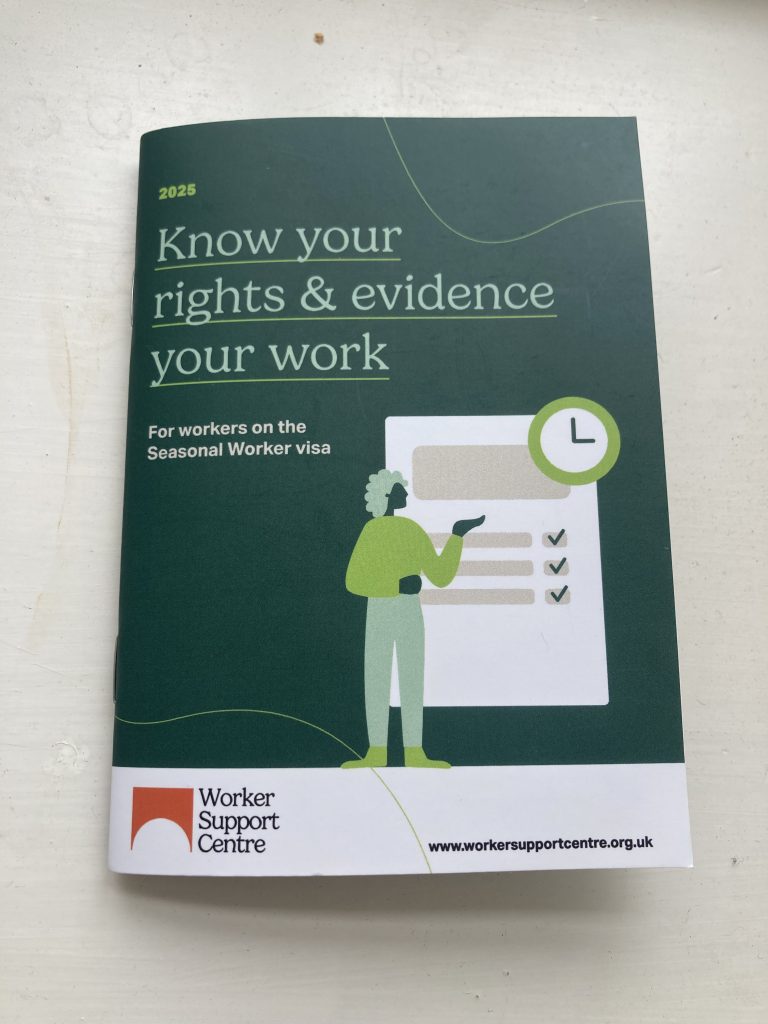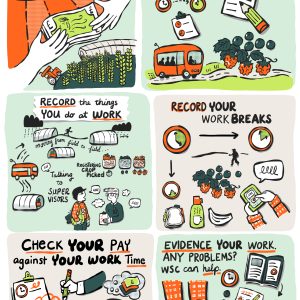The Worker Support Centre (WSC) is proud to launch a ground-breaking new guide today: Know your rights and evidence your work. It is designed to help seasonal farm workers – the people who harvest the berries and vegetables that feed our families – get paid for every hour they work. Today we’re asking you to share this guide widely so that all farm workers can document and evidence their work.
Why this guide is needed
Our research exposed a scandal on the UK’s farms in 2024–25. Seasonal agricultural workers are putting in hours of essential work every day but too often, they are not paid for it. When we analysed 38 payslips from 18 workers across 11 farms, the reality was stark:
- Time spent travelling between fields was almost never paid.
- Collecting equipment or talking to supervisors was often missing from payslips.
- Piece-rate payslips were so complicated they were impossible to understand – and often didn’t match workers’ own records.
This isn’t sloppy bookkeeping. It’s widespread underpayment in one of the UK’s most vital industries.
Worker voices
Behind every payslip is a real person making huge sacrifices. Kevin (chosen pseudonym) from Uzbekistan told the Scottish Left Review earlier this year:
The accounting of hours seemed to be confused, with farms calculating hours in a way that served them. My work time was only paid when I was picking, and there were times when I spent 12–13 hours at work and was paid for eight. When I raised this with my employer I was told: ‘If you don’t like it, you can leave.
Kevin is not alone: 99 farm workers on the UK Seasonal Worker visa raised pay issues with WSC in 2024. More than half said they were not paid for all their working time.
This underlines why WSC exists: to partner with workers on temporary visas, help secure their rights, and build collective power to end exploitation. Their voices and experiences shape everything we do.
Taking evidence to government
So many workers came forward that we took their evidence directly to UK government advisors – including the Low Pay Commission and the Director of Labour Market Enforcement (DLME), Margaret Beels.
In July, based on our evidence, the DLME committed to a review of farm worker payslips. This is an important step towards shining a light on what’s really happening in the UK’s fields.
Supporting workers to evidence their work
While we press for systemic change, we are also making sure workers are equipped to evidence their work. This summer we ran workshops helping workers understand what counts as working time, and how to evidence it.

This is crucial, not least because many are new to the UK’s systems and have limited English.
Our new Know your rights and evidence your work guide builds on this. Available on our website, it also exists as printed pocket booklet in six languages: English, Kyrgyz, Kazakh, Russian, Uzbek and Tajik. It defines paid work time and has a calendar-style format to document hours worked, That way, workers can challenge missing hours on payslips and claim their missing pay.

Along side this workers have co-designed an illustration on pay to show exactly what should be documented and paid.
Together with workers we have already used our guide in meetings with Members of the Scottish Parliament, ensuring politicians also understand the problem – and the solutions.
Our call
As this picking season ends and we prepare for the next, we are determined to make sure every farm worker is paid fairly. All workers should be safe, valued and respected – no matter their job or nationality. And no one should work a 12-hour day and be paid for eight.
Please support our work: Together we can create a future where there is no tolerance for labour abuse or exploitation.
